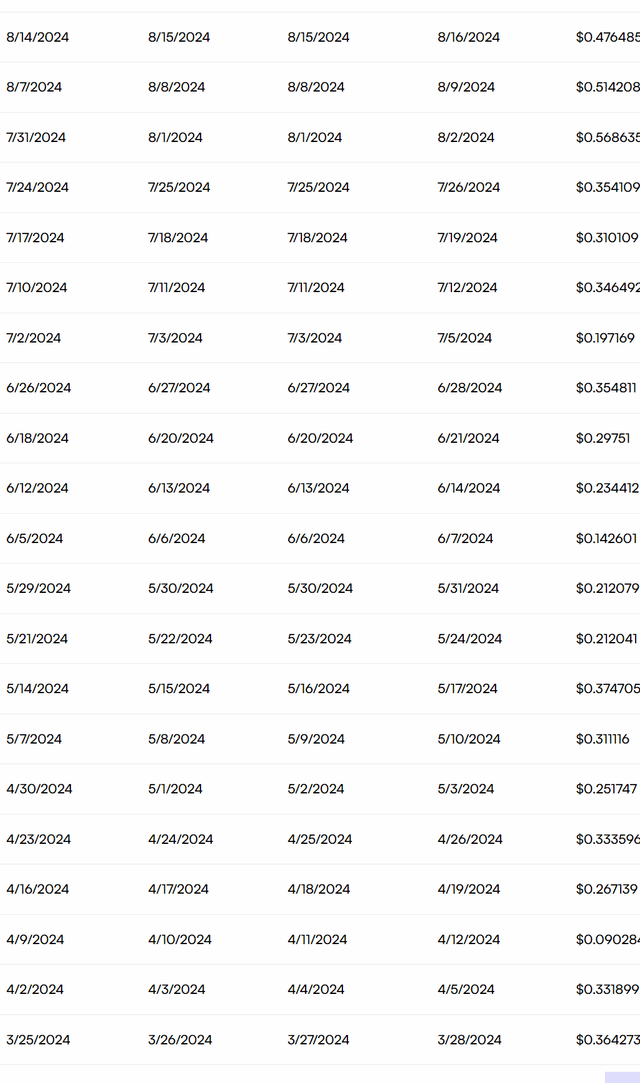QDTE: A New Covered Call Fund That Is Well-Designed
Kathrin Ziegler
Evolution occurs in almost every field, including investing. With rates at historically low levels for most of the last decade, and many investors seeking consistent and substantive income, there have been a variety of new exchange-traded funds on the market focused on providing stable dividends.
An increasingly more common form of income investment is covered call funds. One income-based ETF that recently came to market focused is the Roundhill Innovation-100 0DTE Covered Call Strategy ETF (BATS:QDTE).

QDTE has offered investors total returns of 8.19% over the last 5 months since the fund's inception, while the S&P 500 (SPY) has offered investors total returns of 9.89%.
Today, I am initiating coverage of the Roundhill Innovation-100 0DTE Covered Call Strategy with a buy rating. This fund has offered investors significant income since the ETF's inception in March 2024, and the exchange-traded fund also had only a minimal net asset decline.
QDTE has an expense ratio of .95%, $271.64 million in assets under management, and a forward yield of 16.4%. The fund uses synthetic call spreads that involve buying and selling Nasdaq 100 call options to take a net long position, this exchange-traded fund does not own actual shares. The ETF sells weekly call options to make weekly payouts. The fund also invests money from selling calls in treasury and fixed-income instruments to generate additional income.
A List of QDTE's Holdings (Seeking Alpha)
QDTE has paid out impressive income since the fund's inception in March nearly 16%, but the fund's monthly payments vary significantly because these payouts depend heavily on the implied volatility premiums in the weekly call options the ETF sells.
A List of QDTE's Weekly Payouts (Roundhill Investments)
QDTE's weekly payouts have ranged from $.09 a share to $.57 a share in just the 6 months this ETF has been on the market.
The fund's monthly payouts are taxed as 1099 income and the IRS views them in part as a return on capital that impacts an investor's cost basis for tax purposes when the asset is sold.
Many of the best-performing covered call funds such as the JPMorgan Equity Premium Income ETF (JEPI) sell out-of-the-money calls. This strategy minimizes the decline in net asset value by allowing the investor to take part more in the upside of the investment. While QDTE has seen the net asset value decline 7.79% since March when the ETF came to market, the Nasdaq 100 has been more volatile during this time period, and the fund's total returns have still been solid. Covered call funds perform best when volatility levels are elevated, but not so high as to put the principal at risk. The Nasdaq 100 is a well-diversified index of large-cap companies, this investment has minimal risk of significant loss to principal.
All investments have risks, and the Nasdaq 100 has performed well since this fund's inception in March of this year, the fund carries added risks in a downturn because the covered call strategy QDTE caps upside potential while leaving unlimited downside risks. This ETF would likely see additional net asset value decline in a down market. This fund's options strategy also focuses primarily on weekly options that are taxed at higher levels, so investors not holding this investment in tax-deferred accounts face some additional challenges as well.
The current market conditions are ideal for a covered-call fund such as QDTE. Even though corporate earnings remain solid, there are signs the economy is slowing, and geopolitical uncertainty as well as volatility surrounding the upcoming presidential race exists as well. QDTE should be able to consistently generate substantive levels of income from the fund's option strategy moving forward.
Disclaimer: Investing carries risk. This is not financial advice. The above content should not be regarded as an offer, recommendation, or solicitation on acquiring or disposing of any financial products, any associated discussions, comments, or posts by author or other users should not be considered as such either. It is solely for general information purpose only, which does not consider your own investment objectives, financial situations or needs. TTM assumes no responsibility or warranty for the accuracy and completeness of the information, investors should do their own research and may seek professional advice before investing.
Most Discussed
- 1
- 2
- 3
- 4
- 5
- 6
- 7
- 8
- 9
- 10